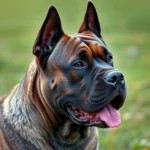
Understanding dog breeds can significantly enhance the experience of dog ownership. Each breed has its unique characteristics, history, and temperament. One such breed that has gained popularity among dog enthusiasts is the Cane Corso. This majestic and powerful breed is known for its loyalty and protective nature. Let’s delve deeper into everything you need to know about the Cane Corso.
History of the Cane Corso
Origin and Ancestry
The Cane Corso has historical roots that trace back to ancient Italy. Originally bred as a working dog, this breed is a descendant of the Roman war dogs, known as Canis Pugnax. These dogs were used in battle due to their strength and bravery. As time passed, the Cane Corso evolved to assist in various tasks, including hunting large game and protecting livestock.
Evolution of the Breed
Over the centuries, the Cane Corso transitioned from a fierce hunting dog to a beloved family companion. Despite its intimidating appearance, this breed has a gentle side, making it a suitable pet for many households. The Cane Corso was officially recognized by the American Kennel Club (AKC) in 2010, solidifying its status as a legitimate breed with specific standards.
Physical Characteristics
Size and Weight
The Cane Corso is a large and powerful dog. Males typically stand between 25 to 27 inches tall at the shoulder and weigh between 110 to 130 pounds. Females are slightly smaller, standing 23 to 25 inches tall and weighing 80 to 100 pounds. Their impressive stature contributes to their imposing presence.
Coat and Color
The Cane Corso has a short, dense coat that is relatively easy to maintain. The coat provides protection against the elements while also showcasing the dog’s muscular physique. Common color variations include fawn, black, gray, and brindle. Some may also have a white patch on their chest, adding to their unique appearance.
Distinctive Features
One of the most striking features of the Cane Corso is its facial structure. The breed has a broad head with a strong muzzle, giving it a confident expression. Their ears are often cropped, although many owners choose to keep them natural. The tail is typically docked, but again, some owners prefer to leave it in its natural state.
Temperament and Behavior
General Temperament
The Cane Corso is known for its loyalty and protective instincts. This breed is naturally wary of strangers, making them excellent guardians for families and homes. Despite their imposing size, Cane Corsos are affectionate with their families and can be quite playful, especially with children.
Socialization Needs
Early socialization is crucial for the Cane Corso to develop a well-rounded temperament. Exposing them to various environments, people, and other animals can help prevent behavioral issues. They generally do well with children, making them suitable family pets. However, their protective nature means they should always be supervised during interactions with young kids and unfamiliar pets.
Exercise and Activity Levels
Cane Corsos require regular exercise to maintain their physical and mental health. Daily walks, playtime, and training sessions are essential. Ideally, they should get at least 60 minutes of exercise each day. Activities that challenge them mentally, such as obedience training or agility courses, can also keep them engaged and happy.
Health Considerations
Common Health Issues
Like all breeds, the Cane Corso is prone to certain health issues. Some common concerns include hip dysplasia, which can affect their mobility, and heart problems, particularly dilated cardiomyopathy. Regular veterinary check-ups can help detect these issues early.
Lifespan
The average lifespan of a Cane Corso is around 10 to 12 years. With proper care, including a balanced diet and regular exercise, many Cane Corsos can live healthy, fulfilling lives.
Preventative Care
Preventative care is essential for the Cane Corso. Regular veterinary visits for vaccinations, dental care, and health screenings can help catch potential issues before they become serious. Owners should also be aware of any breed-specific health concerns and take proactive steps to address them.
Training and Care
Training Approaches
Training a Cane Corso should start early, as these dogs are strong and confident. Positive reinforcement methods work best, rewarding good behavior with treats or praise. Consistency is key; establishing rules and boundaries will help the dog understand expectations. Basic obedience training is crucial for managing their behavior, especially given their size and strength.
Grooming Needs
The grooming needs of a Cane Corso are relatively low. Their short coat requires brushing once a week to remove loose hair and keep the coat healthy. Bathing should be done as needed, typically every few months or when they become particularly dirty. Regular nail trimming and dental care are also essential for their overall health.
Nutrition
Proper nutrition is vital for the health and well-being of a Cane Corso. Owners should provide high-quality dog food that meets their specific dietary needs, considering their size and activity level. A balanced diet rich in proteins, vitamins, and minerals will help keep them healthy and energetic.
Living with a Cane Corso
Ideal Living Environment
The Cane Corso thrives in environments where they have plenty of space to move around. While they can adapt to apartment living, a house with a fenced yard is ideal. They enjoy being outdoors and need enough room to play and exercise.
Compatibility with Families
Cane Corsos are generally good with families and can be excellent companions for children. Their protective instincts make them natural guardians, but it’s essential to teach children how to interact with them respectfully. Socialization with other pets is also important, as Cane Corsos can sometimes be dominant over smaller animals.
Behavioral Challenges
While the Cane Corso is a loving breed, they can present some behavioral challenges. Issues such as aggression towards unfamiliar dogs or separation anxiety can arise if not properly managed. Early socialization and consistent training can help mitigate these problems. Providing mental stimulation and ensuring they have enough exercise can also prevent behavioral issues from developing.
Conclusion
In summary, the Cane Corso is a remarkable breed characterized by its strength, loyalty, and affectionate nature. Understanding their history, physical characteristics, temperament, and care requirements is essential for anyone considering adding a Cane Corso to their family. With the right training and socialization, this breed can be a loving and protective companion that enriches your life. If you’re thinking about bringing a Cane Corso into your home, be sure to conduct further research and consider adoption from rescue groups or reputable breeders.
Frequently Asked Questions (FAQs)
Are Cane Corsos good with children?
Yes, Cane Corsos are generally good with children, especially if they are raised together. Early socialization and teaching kids how to interact with dogs respectfully are crucial.
How much exercise do they need?
Cane Corsos require at least 60 minutes of exercise daily, including walks, playtime, and training activities to keep them physically and mentally stimulated.
What is the best way to train a Cane Corso?
Using positive reinforcement techniques is the most effective way to train a Cane Corso. Consistency, patience, and early socialization are key to their training success.









